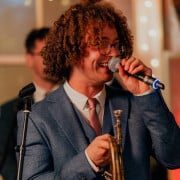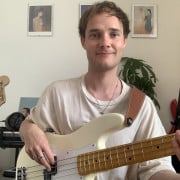Bass guitar teachers in Brighton
-
-
Sam Abbo
Brighton (BN1***), Online
Bass Guitar, A-Level Teacher, Guitar, Songwriting
-
Dominic
Brighton and Hove (BN1***), Hove (BN3***), Online
Bass Guitar, Guitar, Acoustic Guitar, Electric Guitar
-
-

Bass Guitar Lessons in Brighton
Do you want to learn bass guitar? Thinking of taking bass guitar lessons in Brighton? With Music Tutors, you can learn to play like awesome bassists Flea and Victor Wooten with bass guitar lessons in Brighton from a high-quality professional music tutor. Get in touch with one of our great bass guitar tutors and you could start seeing rapid progress today! It doesn’t matter if you’ve just picked up the instrument for the first time or already have playing experience, we can match you with a tutor who can give bass guitar lessons in Brighton tailored to you! Get in touch today for 50% off the first of your bass guitar lessons in Brighton!
Flexible Solutions at MusicTutors.co.uk!
At MusicTutors.co.uk we understand that life can get crazy. That's why our range of amazing tutors offer the option to give bass guitar lessons in Brighton at your own house! Speak to one of our great bass guitar tutors today to organise bass guitar lessons at a time and place that works around your busy schedule. Try the first of your bass guitar lessons in Brighton for half price!
Do I Need My Own Bass for Bass Guitar Lessons in Brighton?
It's always a good idea to have your own bass guitar and amp so you can get practising between lessons. Your new bass guitar teacher will be able to advise you on what bass guitar to buy, and the best way to make sure bass guitar is the instrument for you and your bass guitar lessons in Brighton! Have a read below of what our MusicTutors team has to say about taking bass guitar lessons, and for more information click here.
Professional Trusted Tutors for Your Bass Guitar Lessons in Brighton
Finding safety-assured bass guitar lessons in Brighton can be tricky. At MusicTutors, we are committed to bringing regulation into private music tuition. All of our tutors have been through a recruitment process to ensure the quality of musicianship as well as teaching ability. Additionally, all of our bass guitar tutors must hold the Enhanced DBS Certificate before they can teach with us, building a community of trust between students, teachers, and parents. You can rest easy knowing that your bass guitar lessons in Brighton are as safe as they can be!
Looking for Lessons in Another Instrument?
We are very proud of our team of Brighton tutors, offering not just bass guitar lessons but lessons in all other instruments too. Check out some of our other Brighton music teachers:
- See our Brighton guitar tutors here!
- See our Brighton singing tutors here!
- See our Brighton drum tutors here!
- See our Brighton piano tutors here!
Not Sure About Bass Guitar Lessons in Brighton?
We have great tutors offering bass guitar lessons all over the UK. Check out some of them here...
Our Customers Love MusicTutors
"This is just an amazing company and run by some pretty awesome people. Connecting students with amazing tutors and musicians and helping people connect through the love of music. Music Tutors will influence the future of music education."
5 out of 5
Daniele De Lissandri - Music Tutor at Musictutors.co.uk
Playing the Bass
As you’ve become inspired to take bass guitar lessons in Brighton, you may have seen people play the instrument in different ways. Traditionally, the bass guitar strings are plucked with two of your fingers. This method is taken from the bass guitar's older relative: the double bass. However, different methods of playing the instrument have developed since then too. You may have heard of 'slap bass', a technique that produces a deep percussive timbre which sounds amazing at high speeds. You might have also seen bassists using a pick, much like guitarists do. All three of these methods are valid ways of playing. However, it all depends on the genre! Typically, you wouldn't use a pick in jazz playing, or slap bass in pop, but who's to say you can't mix it up! You can explore this with your teacher in your bass guitar lessons in Brighton.
Buying Your First Bass for Bass Guitar Lessons in Brighton?
When you’re buying your first bass guitar for bass guitar lessons, there are a couple of things that you need to know. Firstly there’s getting the right size instrument! Bass guitars come in a few different sizes: for the younger beginner bassist, we would recommend getting a ½ size or ¾ sized Bass guitar. Either will be fine to get you started, so pick the size that feels most comfortable for you. For those picking up the instrument at a later stage, you should buy a full- size bass. Most basses that you see in a music shop will be a full-size so they are easy to spot. Ask about this in your bass guitar lessons.
There are two common types of bass guitars - acoustic and electric. It is most likely that you will play the electric bass, therefore you will also need an amplifier. It's worth going to your local music shop and seeing if they have a beginner pack which includes a bass guitar, amplifier, plectrums, and a jack lead (which connects the instrument to the amp.)
For an all-inclusive beginner kit, you will be looking at a price between £120- £200. For just a beginner bass guitar on its own, you should look in the region of £100-£200 although there are some options for under £100. Finally, for just the bass amp on its own, you’ll be looking in the region of £150- £300.
Different Types of Electric Bass
Presuming that you have decided to take bass guitar lessons in Brighton with an electric bass, it is likely that you will come across the terms 'Precision Bass' and 'Jazz Bass'. These are the two most well-known types of bass guitar produced by Fender. However, other companies also produce instruments based on these designs, sometimes calling them P style, or J body - so it is good to know the differences between the two.
Precision Bass
The precision bass has a similar body style to the Fender Stratocaster guitar. This bass has been very popular with rock, pop, punk and indie players. Famous players include Sting, Pino Palladino, Nate Mendel, and Mark Hoppus.
Jazz Bass
The jazz bass has what we call an 'offset body'. This is more similar to the Fender Jazzmaster or Jaguar guitar. The shape was primarily designed for jazz players who performed sitting down. So it is worth trying this style of bass standing up, to check that it feels comfortable to you. It's also worth mentioning that the neck will feel a lot slimmer than the P bass.
Other Designs
Of course, these are not the only two styles of bass that you can pick up. However, they are the most common and have been super influential on other bass designs. Other designs include a Sting-Ray from Ernie Ball, as well as bass designs based on famous guitars, including the SG Bass by Epiphone, and the Jazzmaster Bass, also by Fender.

Strings on a Bass Guitar
Your bass guitar teacher will cover this for you in your bass guitar lessons, but here's a bit of starter information to get you ahead of the game! The four strings of a bass guitar are the same as the bottom four strings of a guitar: from low to high E-A-D-G. However, the bass guitar strings are an octave (12 semi-tones) lower, producing a thick deep sound. Also, bass strings are very thick - a lot thicker than Guitar strings. This does mean that they are more expensive to buy, with an average set of strings costing around £20-£25. With this in mind, it's worth taking good care of them so that you don’t need to replace them as often. You can simply wipe them down with a dust cloth, removing any dirt that has got caught between the neck and the strings. This will keep the strings sounding fresh and help them last longer.
It's also worth considering that the width of the strings makes them much more difficult to play than guitar, so it's likely you'll find it tough on your fingers in the beginning. Don’t be discouraged by this - everyone experiences this! Even your favourite virtuoso bass players will have had trouble to begin with. Instead of being afraid of this, accept the challenge! Play for a short amount of time each day - when your fingers start to hurt, take a break and come back to it. By playing for a short time each day, you'll soon build finger strength, and you won't find it tricky at all after a while! If you carry on with this positive mindset, you’ll find the learning process more enjoyable, plus you'll find you're making progress really quickly!
Finding Your Way Around the Fret Board
When we first pick up the bass it can seem daunting: in front of us are what seems like hundreds of frets and an endless stream of notes. But hopefully, we can give you some pointers to get you started. Let’s take the bottom E string. When we play it on its own with no fingers on the fretboard, we call that playing an “open” string. Once we’re ready to play “fretted notes” (notes that sound by putting our left-hand fingers on the fretboard), we need to know which fret is which. This will seem very difficult at first, but it is just a matter of counting.
Our “open” E string we number as Zero.
The first fret is 1.
From there, each fret is a new note that is one semi-tone away from the last.
Just try playing each of the frets, from the first fret going up by one each time so that your hand is moving closer to you.
Once you get to your 12th fret, you're back round to E. This principle also applies for the other three strings. Try practising getting familiar with this outside of your bass guitar lessons, to improve as quickly as possible!
Tuning Your Bass
Tuning is another obstacle that guitarists and bassists need to learn in the early stages. In fact, we recommend that it is one of the first things you learn. To get you started, you can purchase a tuner which will tell you if the bass notes are sharp or flat. An alternative way is to tune to a Piano. To do this you would play the E-A-D-and G notes on a Piano and then compare the two notes. Spend some time trying to match the open string notes to the piano notes, turning the pegs only a tiny bit each time. This will be harder at the beginning because we are training our ears and trying to understand new and abstract concepts. But mastering this will improve your musical ear from the start. Your teacher can help you with this in your first bass guitar lessons in Brighton.
Knowing What to Play
Most bass parts consist of single notes. However, it is possible to play chords, but this technique is not common - the instrument already has a deep sound, so chords can sound too muddy and can be tricky to pair with other chordal instruments like guitar. However, chordal bass parts have been used in some great songs, and can sound really nice, especially in the bass' higher register. Play around with chords, single note parts and some different techniques - have a listen to the bass parts in your favourite songs, discover what you love to play, and take this to your bass guitar lessons!
Using a Metronome
Playing with good timing is important for any musician, but it's especially important for bassists! Sometimes, this is something people realise after playing for a couple of years, and they have to jump back to basics to work on this. It's best to work on this from the very beginning, that way it's ingrained in your playing for life!
We suggest buying a metronome! This is a device that clicks at an even pace, so each click can represent a beat in the bar. Start off with 4/4 - four beats in a bar. Let the metronome do the counting for you, and aim to play exactly on each click of the metronome. This is a difficult task, and not always the most exciting one, but don’t feel discouraged! Every musician has to learn to do this, and it's so worth the hard work! Having an excellent grasp on the fundamentals is what separates a good player from a great one.
Playing in a Band
Something you can't explore fully within your bass guitar lessons is playing with a whole band of other people - this is definitely recommended though! And when taking bass guitar lessons in Brighton, there's really no excuse as there's so much to get involved in! In a pop and rock context, the bass takes on a unique role that almost has more in common with the drums than the guitar or vocals. Together, the bass and drums make the 'rhythm section', and they lead the band together. Often, the rhythms in the bass will be similar to the rhythms in the drums - this is called “locking in”. For example, you may play the same rhythm as the bass drum, or you might elaborate that with some of the rhythms from the snare or toms. Although a simple concept to understand, it is difficult to master playing perfectly in time with other insturments. But like everything - we get better with practise! Here’s what we suggest: make friends with a drummer and get together just the two of you - here, you can practise just playing at the exact same time as the bass drum. Once you have this down, you’ll find playing with a full band, where there are other rhythms and melodies going on, everything will sound tighter and more together.
Iconic Bass-Lines
Often the Bass takes the role of sitting behind the guitars and vocals, acting in a role that is halfway between being melodic and percussive. However, there some iconic examples of the Bass being used to supply the riffs and key hooks of a tune. Here are a few examples you could start to look at:
- Longview - Green Day
- Money - Pink Floyd
- She’s Lost Control - Joy Division
- Another One Bites the Dust - Queen
- Under Pressure - Queen
- Around the World - Red Hot Chilli Peppers
- Every Breath You Take - The Police
Maintaining Your Bass
Here are three tips for maintaining and optimizing your bass. These are also things to look out for when buying a new/used bass.
The Neck:
The neck of the bass should curve ever so slightly away from you when holding it in the playing position. It may look straight even though it is correctly set up. This can be adjusted with the truss rod which is a long metal rod positioned inside the neck which can be tightened or loosened in order to relieve tension on the neck. If the neck is too straight, the strings will buzz on the frets and the truss rod should, therefore, be tightened. Seek help from a professional if you do not have any experience in adjusting the neck on your bass. If you tighten or loosen the truss rod too much, it can break the neck.
Action:
The distance between the fretboard and the strings (and therefore the amount of pressure required to make a clean sound) is described as the guitar's 'action'. Some players prefer a high action because of the sound it gives the instrument. For beginners, a lower action is recommended. Action can be altered by adjusting screws that determine the height of the strings on the bridge. When the strings are low but do not buzz against the fret, the set-up is correct.
Brighton: A Great Place for Music
Brighton is often described as London by the sea - and for good reason! The city is jam-packed with amazing music, arts and culture with something for everyone to enjoy. There are many great musicians to have come from Brighton across many genres including The Kooks, The Levellers, Rizzle Kicks, British Sea Power, Bat for Lashes, and Blood Red Shoes.
Brighton’s music scene is buzzing and vibrant with an eclectic mix of venues. The biggest venue is the Brighton Centre which regularly hosts huge concerts from big names. Another larger venue is the Brighton Dome. For lovers of smaller venues, you'll want to check out places such as Komedia, The Hope and Ruin, and the Concorde 2, a club venue right on the picturesque seafront. Brighton also hosts a diverse range of festivals such as The Great Escape, The Brighton Festival where you can immerse yourself in Music, Art and Theatre.
There’s no feeling better than playing live with other musicians. This will enhance your skills as a musician as well as lessons from a high-quality professional music tutor. Luckily, there's a range of great amateur groups that you can get involved with. The Brighton and Hove Concert Orchestra is an amateur group formed over 50 years ago that regularly rehearses and performs in the local area. Similarly, The Brighton Chamber Choir are a group of singers who perform everything from Classical to Broadway Musicals. Whatever style of music you enjoy, it is so important to play and enjoy music with other musicians.
For those looking to get their first instruments or an upgrade on their current one, there is a fantastic selection of music shops that can help and guide you on your journey. GAK is a fantastic place to find your perfect guitar, bass, drum kit and live sound equipment. David Ingledew Pianos is a fantastic place for grand and upright pianos. Finally, Hobgoblin Music is a great place to search for acoustic instruments such as violins and violas, and Ackerman Music has a stunning selection of Classical instruments and sheet music.

Get in Touch
At MusicTutors, we are always there to help connect students with their perfect tutor. If you have any questions about bass guitar lessons in Brighton, call us on 07946 125613 or get in touch by e-mail [email protected]. We look forward to hearing from you!
Do You Want to Be a Music Tutor at MusicTutors.co.uk?
We are always looking for talented music tutors all over the UK. Think you're the right person for the job?
Apply here!





